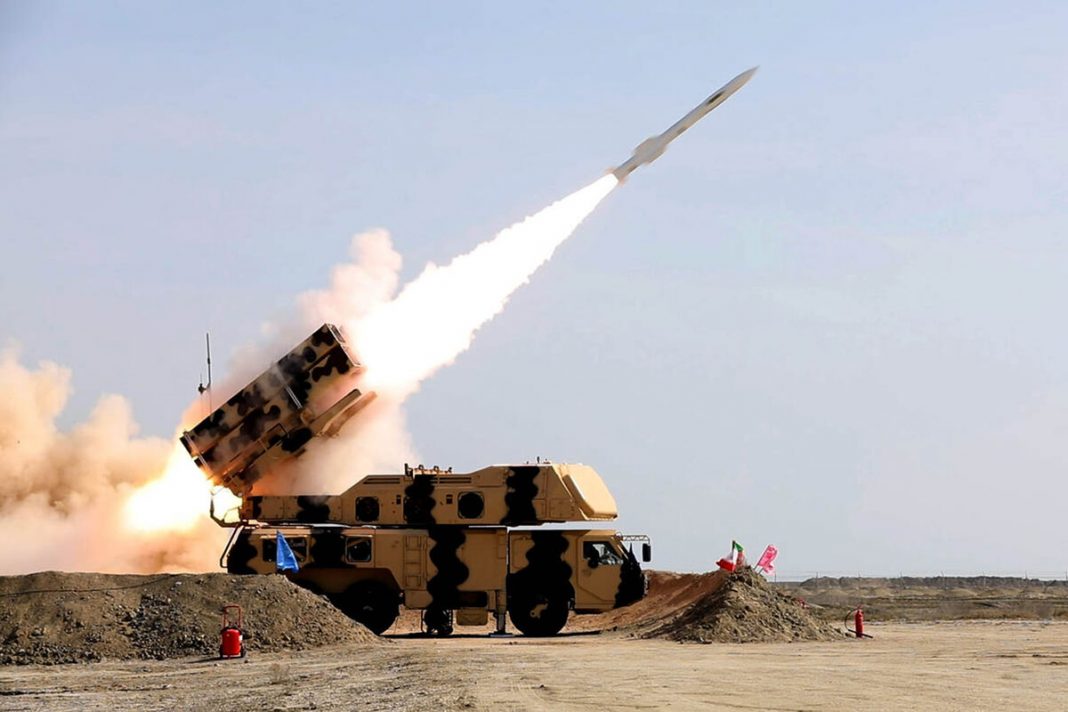Predicting developments in the Middle East is a thankless task. At any moment, missile strikes or bomb explosions change the balance of power and provoke new predictions and assumptions. One thing is certain: the region has become one of the world’s hottest spots.
A new escalation of tension in the Middle East has resulted from Israel’s elimination of high-ranking officials of the so-called “Axis of Resistance” (Tehran and pro-Iranian formations in Lebanon, Iraq and Yemen) and Hamas.
In mid-July, the Israelis struck Gaza, killing Hamas military leader Mohammed Deif, the number two man in the Palestinian organisation’s hierarchy. Israel then launched a precision airstrike on the Lebanese capital Beirut. The strike killed Fuad Shukr, one of Hezbollah’s top commanders. And just 10 hours later, there was an explosion in Tehran that took the life of Hamas political leader Ismail Haniyeh.
In this piece Ascolta analyses the internal political situation in the Middle East, as well as the main geopolitical aspects that have a direct impact on the region. Against the backdrop of the constant escalation, an attempt is made to define the main positions of the parties, including the issue of launching a full-scale war.
This Content Is Only For Subscribers
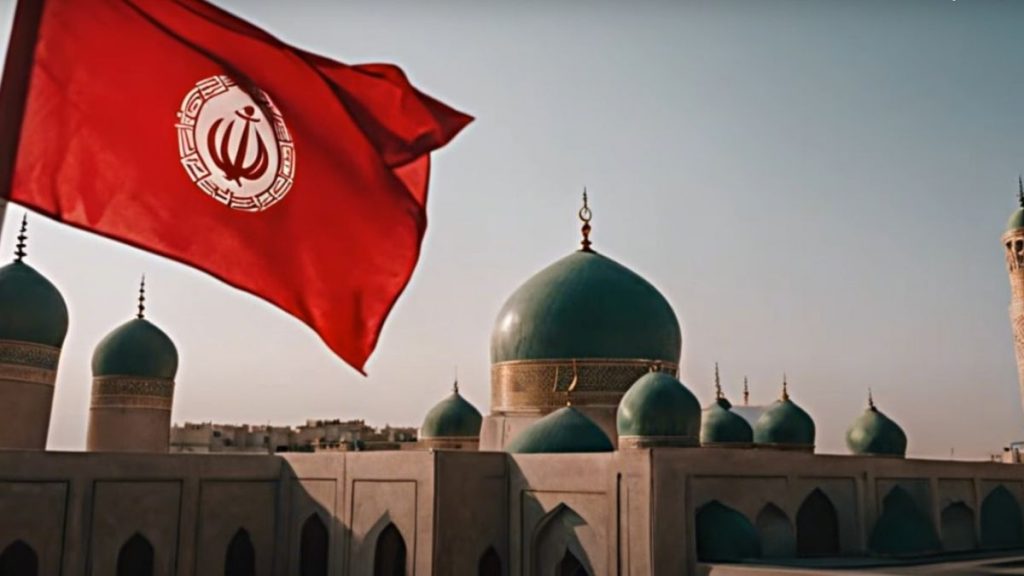
After the farewell ceremony for Haniyeh, Mohammad-Bagher Ghalibaf, Chief of General Staff of the Iranian Armed Forces, said that the “Axis of Resistance” is exploring various options to “retaliate for the blood of the martyr”. And on the same day, Reuters reported that senior Iranian military officials held meetings with their counterparts from other countries. There they discussed a possible response to Israel.
Incidentally, this topic sparked a discussion in the “Axis of Resistance.” Many politicians, both in Iran and Lebanon, demanded immediate retaliation. At the same time, others argued that Israel and the U.S. are now on high alert and it is better to wait a month or two, or even more, for a surprise strike. Among the latter is Hezbollah general secretary Hassan Nasrallah. He promised a “tough response” to Israel, but noted that the movement will not be in a hurry: the attack should take the Israelis by surprise. At the same time, the Hezbollah leader announced a powerful but “thoughtful” response, signalling that the Resistance Axis intends to respond to the attacks in Beirut and Tehran rather than launch a major war.
Initial predictions of the date of Tehran’s retaliatory strike pointed to 5 August. However, this prediction proved to be untenable. This is despite the fact that just before this date, the Axios newspaper, citing three sources among US and Israeli officials, circulated allegedly “reliable” information. And they predicted that Tehran’s strike would follow the same scenario as the previous one in April, but would be on a larger scale.
However, there are plenty of predictions about the new date of Iran’s attack. In this sense, complete chaos reigns in the media space. So the Israeli newspaper The Jerusalem Post (JP) calls the new date of the retaliatory strike 12-13 August on the holy day of Tisha Be-Av, which in Israel is considered the national day of mourning of the Jewish people. On that day, the First and Second Temples of Jerusalem were destroyed. And as noted, the response would be comprehensive, from several countries at once – Yemen, Syria, Iraq and Iran.
It is this scenario, as Axios wrote, citing sources, that is most feared in Israel and the United States. Joe Biden has promised his Middle Eastern ally support in the event of an Iranian attack. American forces are still in the region and are deployed in combat formation. At the same time, the White House head emphasised the importance of de-escalation, even if the exact opposite is happening today. Perhaps it will happen, but after a serious escalation.
For now, without exaggeration, the attention of the whole world is focused on a possible confrontation between Israel and Iran, whose actions will determine the approach of a major war in the Middle East. What can Iran do against Israel – and does Tehran see the sense in it? Will the conflict between Israel and Hamas in the Gaza Strip escalate into a full-scale war involving other countries? And even if not – what might be the consequences. Who is behind the new escalation of Middle East tensions and is there any chance for a settlement of the conflict? Let us try as far as possible to “unravel” the complicated tangle, modelling the possible course of events.
A mysterious murder with unpredictable consequences
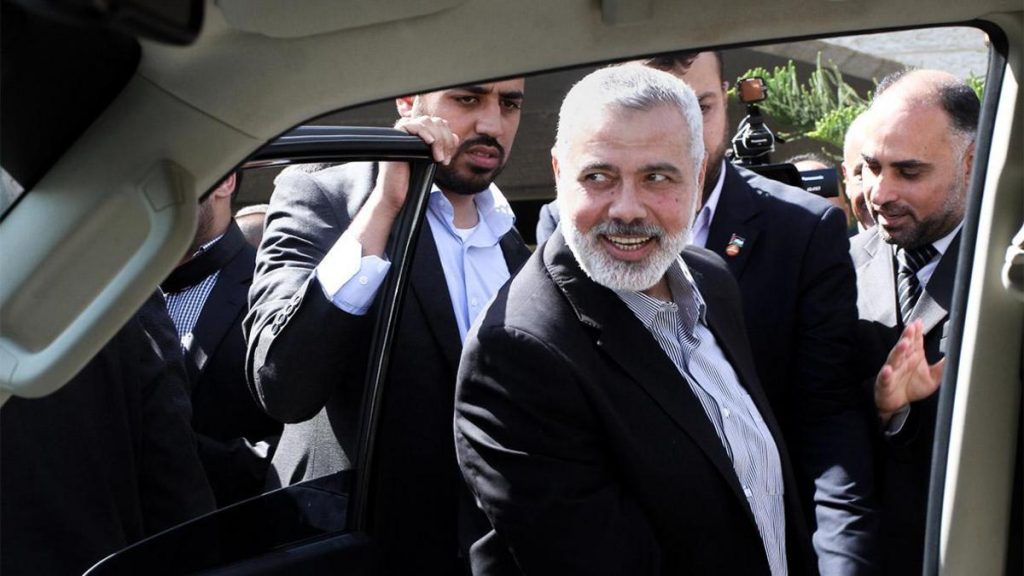
The assassination of Hamas politburo chief Ismail Haniyeh in Tehran, where he had arrived for the inauguration of new President Massoud Pezeshkian, has triggered a new round of Iranian-Israeli escalation and confused the cards for many political players both inside and outside Iran.
Obviously, the main “victims” of this assassination were the notional peace party and the newly elected Iranian President Massoud Pezeshkian.
With his election, Iran seemed ready to soften its policies. All is now history – the reformist has found himself handcuffed and cornered. The hawks in Tehran received an unexpected gift from the Israeli prime minister. Now all talk of dialogue with the West can be buried under the weight of one argument: negotiating with the West is pointless, they will deceive you, throw you away, and stab you in the face at the most unexpected moment. We are far from thinking of the assassination of Haniyeh as the radical forces’ response to losing the presidential election. But the fact remains that Pazeshkian’s honeymoon ended before it could begin. And now he is forced to listen in humility to Khamenei’s threats against Israel and the US.
The assassination of Ismail Haniyeh really raises a lot of questions and produces a lot of versions in the style of “cui prodest”.
It is worth noting that Israel at the official level does not confirm its involvement in the assassination of Ismail Haniyeh, although as the Washington Post notes, they notified the U.S. immediately after his elimination. On August 1, Israel Defence Forces (IDF) spokesman Daniel Hagari recalled that “on Tuesday night, Fuad Shukr,” a prominent military leader of Hezbollah, a Shiite group close to Iran, was eliminated by a targeted airstrike in Lebanon”.
“I want to emphasise: there were no other airstrikes. No Israeli missiles or drones over the entire Middle East that night. That’s all I can say,” he added. Recall that the Hamas statement claimed: Ismail Haniyeh was killed in an Israeli airstrike on Tehran. However, it is likely that Mr Hagari and those who hold Israel responsible for what happened were telling the truth. The New York Times (NYT) reported, citing sources, that Ismail Haniyeh was actually killed by an explosive device that agents of Israel’s Mossad intelligence service had smuggled into the bedroom of the Hamas leader’s residence in advance. How could such a thing happen in the heavily guarded residence of the Islamic Revolutionary Guard Corps? How did these guards allow this to happen? That remains the big mystery. I don’t want to resort to conspiracy theories, but they are straightforward. The Ayatollah regime is not very popular in Iran, and, according to some sources, not popular at all, even to the point of hatred in some cases. Again, one has to wonder if this is a conspiracy. Lots of coincidences lately. First the president of the country crashes in a helicopter, then there is a bomb in the very heart of the “axis of resistance”.
However, Iran is absolutely sure that the assassination of Haniyeh is the work of the Israelis. Therefore, the necessity of Tehran’s ostentatious decisive action is conditioned by another new circumstance – an unfolding scandal in the Iranian power structures, which requires urgent correction of their reputation.
As the British newspaper Telegraph notes, for the Iranian security services, the demonstrative assassination of Ismail Haniyeh in Tehran, which took place the day after the inauguration of the new president, was “a humiliation that opened up a huge security gap.” As part of the investigation into the assassination of Hamas politburo chief Ismail Haniyeh, senior intelligence, military officials and staff at the Tehran guesthouse where the crime took place have been arrested, More than 20 people have been detained in total. The Islamic Revolutionary Guard Corps (IRGC) is leading the investigation. Its officers are looking for suspects who are expected to help reach the people linked to the murder.
So let us repeat and reiterate that the IRGC’s wounded ego and “ringing slap” is almost the main reason for preparing a retaliatory strike by Iran. It is like a good landmine in a bad game.
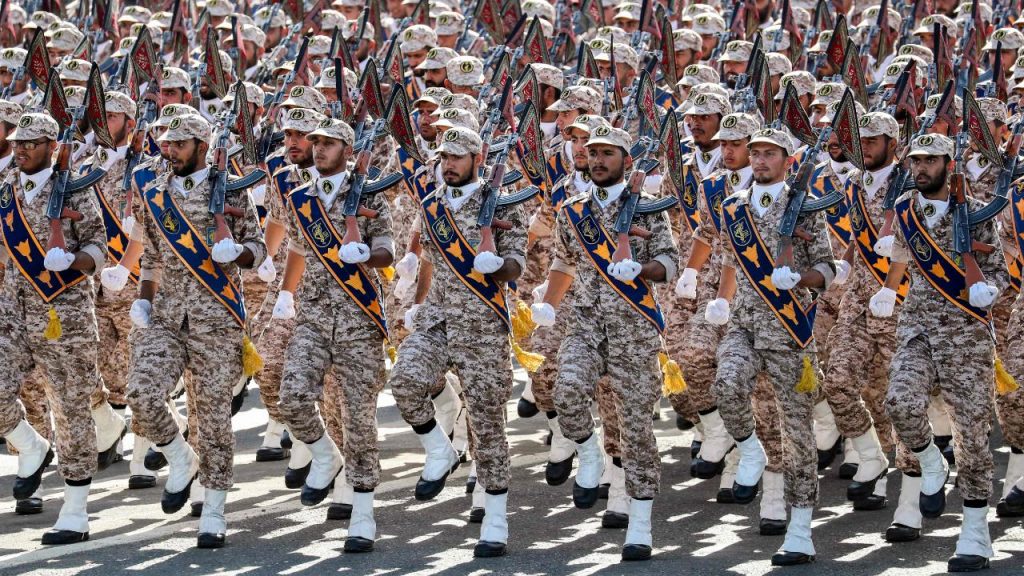
Another party that clearly did not want an escalation of tensions in the Middle East is the United States of America, more precisely the administration of Joseph Biden and new presidential candidate Camila Harris. Joe Biden came to the White House in 2021 hoping to renew the agreement with Iran on its nuclear programme, freeze the crisis in the Middle East and focus on the two main adversaries, China and Russia. However, the exact opposite happened Khamenei and the late Iranian President Raisi blocked constructive nuclear dialogue. Then Hamas atrocities forced Biden to take on Israel and Palestine personally, giving free rein to Prime Minister Benjamin Netanyahu. And as many observers believe, that was Biden’s fatal mistake.
Today, he is trying to make amends and clinging doggedly to the elusive goal of a cease-fire agreement that would end the fighting in the Gaza Strip, even though the killings blamed on Israel may have undermined the entire effort and brought the Middle East closer to a full-scale regional war. Secretary of State Anthony Blinken has repeatedly noted that Washington’s main focus remains on diplomacy between Israel and the militant group Hamas, with Blinken describing it as key to achieving calm on other fronts.
“The best way to lower the temperature everywhere, to put us on a better path, is a ceasefire in Gaza,” US Secretary of State Anthony Blinken said. “I think it will have an important impact on other regions where you can see conflict – whether it’s northern Israel and Lebanon, whether it’s Iran, whether it’s the Red Sea with the Houthis.”
The Biden team’s focus on negotiating a ceasefire in the Gaza Strip underscores how much the US is counting on those talks as a key factor in preventing a wider regional war. And Haniyeh’s assassination clearly did not bring the sides any closer to peace and was a reason to criticise Netanyahu’s government in Washington. Thus US Senate Armed Services Committee Chairman Jack Reed (D-Ill.) wondered whether Israel, whose leaders, especially Prime Minister Benjamin Netanyahu, were deliberately trying to undermine the talks, given that Haniyeh was one of the negotiators. “The fear is that it will cause an escalation because in the centre of Beirut they took someone out and in the centre of Tehran they took someone out,” Reid said. “The question is what impact that will have on the negotiations. I don’t think it will help, I think it will set them back. It may be part of the logic of attacking it.”
There are, incidentally, diametrically opposed points of view: the assassination of Ismail Haniyeh, paradoxical as it may sound, may push up peace talks between Israel and Hamas. This is what informed sources of the Axios portal believe, explaining: the dead leader of the Palestinian group had a tougher stance on the deal than, for example, Yahya Sinwar, who has already been elected as the new head of the Hamas politburo. It is hard to believe that Sinwar, who is seen in Israel as the mastermind behind the 7 October attack on Israel, would be more accommodating in negotiations with Israel.
The Guardian, for example, believes that it was Haniyeh who was more moderate in leading Hamas delegations to talks brokered by Egypt, Qatar and the US aimed at a ceasefire and an agreement to release hostages and prisoners. He lived in Qatar and had a decent fortune, rather than hiding in the tunnels of Gaza as Sinwar does. Sinwar, the group’s former intelligence chief, spent 23 years in Israeli prisons, serving four life sentences for attempted murder and sabotage. A former interrogator described him as “1,000 per cent loyal and 1,000 per cent brutal, a very, very tough man. In response to Sinwar’s appointment, Israeli army spokesman Rear Admiral Daniel Hagari told Saudi TV channel Al Arabiya: “There is only one place for Yahya Sinwar, and it is next to Mohammed Deif and the rest of the 7 October terrorists. This is the only place we are preparing and planning for him.”
Speaking to Al Jazeera TV after the announcement, Hamas spokesman Osama Hamdan said Sinwar would continue ceasefire talks. “The problem with the negotiations is not the change in Hamas,” he said, accusing Israel of failing to broker a deal. US Secretary of State Anthony Blinken told reporters on 6 August that Yahya Sinwar, the new head of Hamas’ political bureau, should help bring about a ceasefire because he “has been and remains the main decision-maker.” Netanyahu, on the other hand, assures everyone that the assassination in Tehran will temporarily delay negotiations, but will eventually lead to a quicker ceasefire by putting pressure on Hamas.
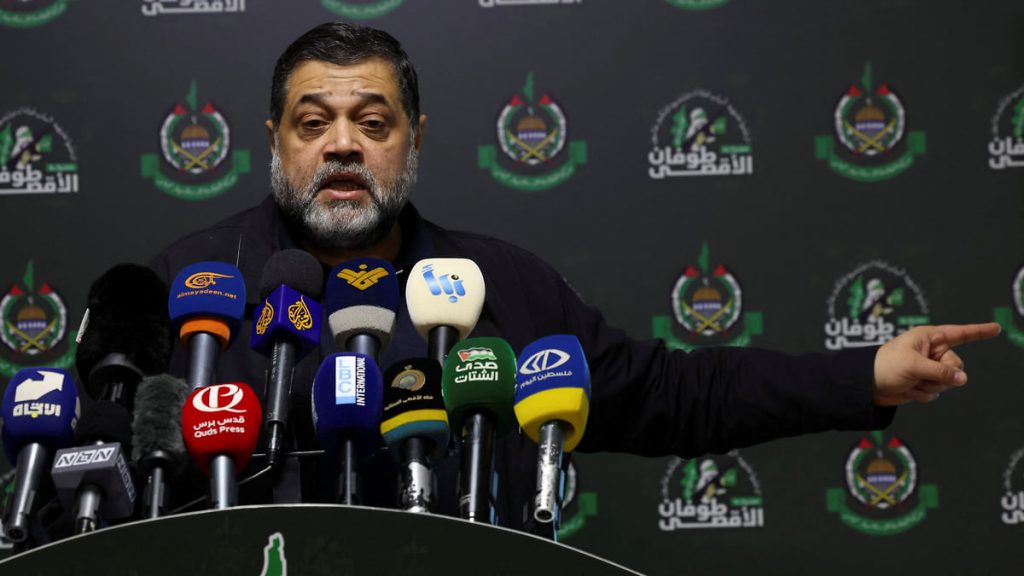
Netanyahu leads a coalition of far-right nationalist parties. In December 2022, the country formed the most right-wing government in history. And now these extreme right-wing voices are calling on Netanyahu to take more decisive action: to open a second front, to start a war with Hezbollah in Lebanon. These are the very people who scolded Netanyahu for his restrained response to the 14 April attack. And thanks to successful pinpoint eliminations, Netanyahu can look like a politician who gets results in the eyes of his right-wing coalition.
On the other hand, there is a huge demand in Israel for peace and any deal with Hamas – just to save the hostages. That’s the other side of the scale. And Netanyahu has to choose.
In addition, the US explains that Netanyahu also has personal reasons for dragging out the fighting. The Israeli leader is under pressure from far-right figures crucial to maintaining his ruling coalition to not give an inch to Hamas and to be more defiant against the Islamist regime in Tehran. Many U.S. officials also suspect that Netanyahu, who faces corruption charges, believes that continuing to fight is the best way for him to stay in power and avoid jail. And in this they have a big divergence with Joe Biden, who wants to do his best to prevent a hot open phase of war and leave the White House as a peacemaker.
Moreover, he still hopes to sign a swap deal between Israel and Hamas and thus end the war in Gaza. Although today such plans look like absolute fantasy. But sources say that in his last conversation with Benjamin Netanyahu, Biden said that he was defending Israel in the face of the Iranian threat one last time. And if Bibi continues in his vein, let him blame himself. If only someone had said similar words to Ayatollah Khamenei. There would be a better chance of de-escalation.
Growing confrontation
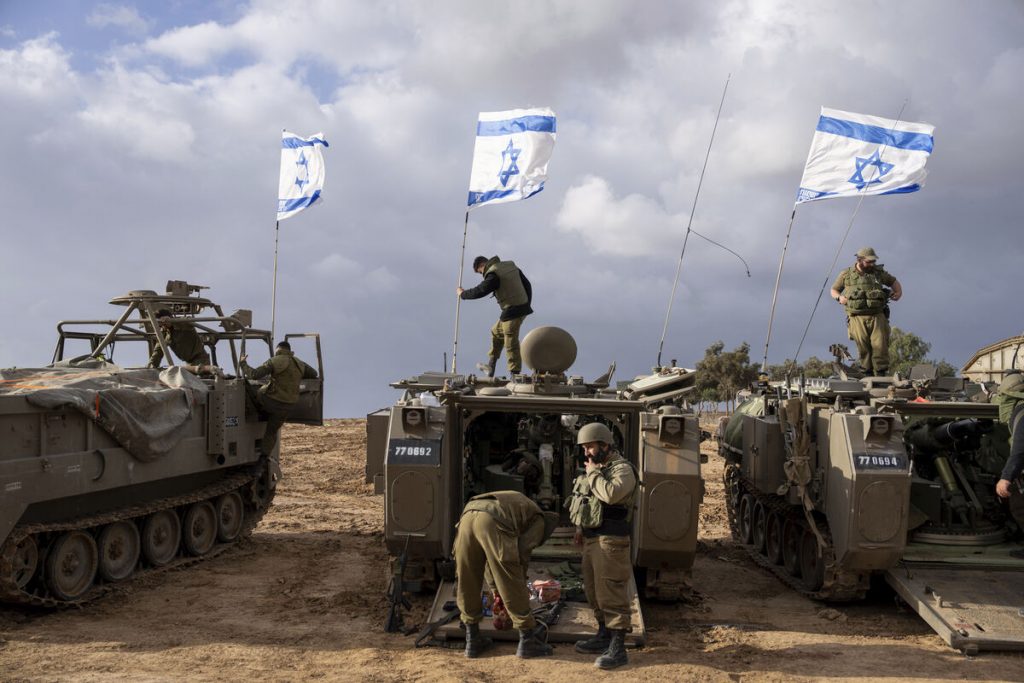
Israel is anxiously preparing for a retaliatory strike from Tehran. The Jerusalem municipality has advised residents to “clean and prepare their bomb shelters,” warning that people should be able to reach shelters in 90 seconds. Panic is also fuelled by the shutdown of GPS signals in Tel Aviv on 5 August – the last time there were such failures was before the Iranian attack in April.
Recall that the last large-scale Iranian attack on Israel took place on the night of 14 April 2024. In that Iranian attack, according to various sources, several hundred missiles and unmanned aerial vehicles were involved, including Shahed kamikaze drones, Fattah and Fattah-2 hypersonic missiles. Iran then launched a total of more than three hundred munitions and UAVs. During the attack, the US Air Force based in Jordan and Saudi Arabia, along with fighter jets from France, Britain and Jordan, intercepted more than 80 Iranian UAVs. However, Iran then gave advance notice of the attack, giving the Pentagon time to move additional ships and aircraft to the region and U.S. commanders time to negotiate access for U.S. aircraft to other countries’ airspace.
The sides differed in their assessment of the effectiveness of that attack. Israel said that only “a few missiles” were not shot down and reached the country’s territory, causing “minor damage”. In turn, Iran’s Press TV reported that all hypersonic missiles reached their targets. Now the assassination of Hamas politburo chief Ismail Haniyeh in Tehran brings back to life the possibility of an attack on Israeli territory.
Preparations for it in Israel are in full swing. During a visit to the Israeli Air Force’s underground command centre in Tel Aviv, Defence Minister Yoav Galant warned that the military must “be prepared for all possible scenarios” to counter Iran and its allies, “including a rapid transition to an offensive”. The minister did not specify the direction of the main strike, but there is a high probability that it is the northern direction. Back in mid-June, the Israel Defence Forces (IDF) reported on the development of operational plans to invade Lebanon, where the pro-Iranian group Hezbollah is based.
Israel is also exploring other options, including a pre-emptive strike against Iran. This option was mentioned at a Security Council meeting attended by the country’s top military and political leadership. According to the Israeli portal Ynet, some participants in the meeting argued that a preemptive strike could derail Tehran’s plans. Israeli security officials, however, clarified that such a move could only be authorised if intelligence confirms that Iran is planning a massive strike.
Another scenario, which is allowed in Israel, is that Iran and regional groups close to it will try to “blow up” the situation by infiltrating into the West Bank. According to Israel Army Radio, the military has increased its presence in the Tulkarm settlement on the West Bank-Israel border. Israeli security services were reportedly warned that Iranian and Hamas saboteurs would attempt to infiltrate the West Bank and further into Israel to stage terrorist attacks.
Amid the escalation, the Pentagon sent an aircraft carrier strike group, a fighter squadron and additional warships to the Middle East. It was the largest US troop move to the region since the Gaza war began in October – at which time the US sent two carrier strike groups. On the same day, Britain moved military personnel to Cyprus to prepare for the possible evacuation of British subjects from Lebanon. In addition, London put the Royal Air Force at the Akrotiri airbase in Cyprus on high alert.
The seriousness of the situation is also reflected in the visit to Israel of the head of the US military’s Central Command, Michael Kuryla, who is supposed to coordinate the Israeli-American response to Iran. He met with Israel Defence Forces Chief of General Staff Herzi Halevi. “The commanders jointly assessed the security situation and strategic challenges. The IDF will continue to deepen relations with the US Armed Forces, based on the desire to enhance stability in the region and coordinate actions between the armed forces of the two countries,” reads a statement on the Israeli army’s social media page X.
In addition, Israeli Defence Minister Yoav Galant met with his British counterpart John Healy. According to the Israeli Defence Ministry, the head of the ministry “stressed the importance of building a coalition to defend against Iran and its proxy forces. It was about such a coalition that Prime Minister Netanyahu spoke about during a speech to the US Congress on 24 July, calling on Washington to create a Middle East analogue of NATO. The Israeli politician proposed to include in this structure the countries of the region that have diplomatic relations with Israel (UAE, Bahrain, Egypt, Jordan, Sudan and Morocco).
However, in addition to providing military aid, Washington is also trying to reach out to Iran and warn Prime Minister Benjamin Netanyahu against excessive aggressiveness. The United States does not need a major conflict in the Middle East, especially in this region: the presidential elections are coming up. The reaction of US President Joe Biden was quite revealing. Despite the complexity of the situation, answering a journalist’s question whether Tehran would refuse to avenge the assassination of Hamas leader Ismail Haniyeh, US President Joe Biden urged not to rush things. “I hope so. I don’t know,” Mr Biden said. He held a telephone conversation with Israeli Prime Minister Benjamin Netanyahu beforehand and warned him against new forceful actions not coordinated with Washington. According to the US media, having promised assistance in repelling the Iranian attack, Joe Biden at the same time urged the Israeli prime minister to further focus not on new strikes against Iran and groups controlled by it in the Middle East, but on peace talks.
“To hit or not to hit.”
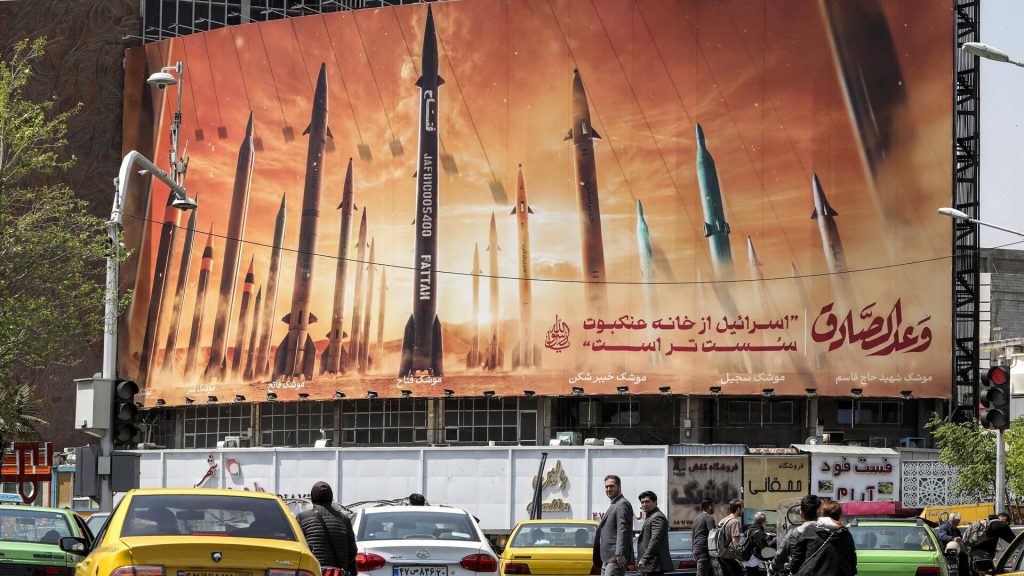
It’s hard to believe today, but Israel and Iran were not always enemies. Iran recognised Israel’s independence back in 1950 – one of the first in the Muslim world. Under Shah Mohammad Reza Pahlavi, Iran and Israel were allies in the Middle East, developing business and military co-operation. Thus, Iran was the main supplier of oil to Israel, and Israel trained the Iranian army and sold Iran weapons. The Eilat-Ashkelon oil pipeline is still owned by a joint Iranian-Israeli company (though Iran does not get its share of the profits – Israel freezes the money in a special account to transfer it to Tehran after the regime change and normalisation of relations).
Before the Islamic Revolution there was a large Jewish community in Iran, there was no animosity between Iranian Shiites and Jews, their relations were quite good-neighbourly. Everything changed when the Ayatollahs came to power in 1979. Islamic fundamentalists declared the main source of all Iran’s troubles and the “Big Satan” to be the United States. And Israel, as an ally of the Americans and representative of the Western world in the Middle East, was branded the “Little Satan.” In June 2017, on Jerusalem Day, an electronic clock counting down Israel’s existence was installed in Palestine Square in the centre of Tehran. And the destruction of the “Zionist entity” is the official goal of the Iranian authorities, to which a special law is even dedicated in Iran.
That is, in fact, Iran has been at war with Israel since the Islamic Revolution of 1979. However, this war is not waged directly, but by hybrid methods: through terrorist attacks, attacks on Jews and Jewish community centres and synagogues in different countries of the world, shelling of Israeli territories from Lebanon, Iraq, Syria and the Gaza Strip, as well as cyber attacks on government websites, information systems of medical institutions, universities, insurance companies and other businesses. And of course, Iranian authorities have resorted to massive anti-Israeli propaganda around the world. And since the spring of 2024, they have attacked Israel from their own territory for the first time. Today, the risk of a repeat of the events of five months ago is increasing every day.
Iran’s interest in striking Israel lies not only in a show of force, but also in inflicting significant pain and damage on Israelis. However, Iran faces a serious problem: while they can inflict damage with a first strike, they do not have the military means and capabilities to defend themselves against retaliatory strikes from Israel, the United States, or a combination of both and their allies. The best-case scenario for Iran is therefore a strike that creates a chain reaction and prevents Israel from organising an immediate or effective counterattack. The other thing is, is Iran ready for that?
At first glance, collective retaliation on all fronts at once looks like one of the most likely scenarios. Hezbollah leader Hassan Nasrallah said that the conflict with Israel has “entered a new phase on all fronts.” “We are facing a major battle, this issue has grown into more than just a support front,” the secretary general emphasised, hinting at a possible regional war involving all the forces of the “Axis of Resistance”.
In Tehran itself, harsh rhetoric against Israel has been heard daily since the death of Palestinian Hamas leader Ismail Haniyeh. In the Iranian Majlis, MP Mohammad Qasim Osmani threatened to eliminate Israeli Prime Minister Benjamin Netanyahu as blood revenge for the assassination of Ismail Haniyeh, head of the Palestinian Hamas politburo in Tehran. “I hope that another Operation True Promise will be carried out as blood revenge for Ismail Haniyeh. We will not agree to anything less than Netanyahu’s death,” Iranian media quoted Mr Osmani as saying in parliament. Operation True Promise, Mohammad Qasim Osmani said, was carried out on the night of 14 April in response to a strike on the Iranian consulate in Syria. However, Iran is unlikely to conduct a targeted operation to eliminate high-ranking Israelis because the country simply does not have such capabilities. If they did, they would have used it by now.
On 5 August, Secretary of the Russian Security Council Sergei Shoigu flew to Tehran and met with the new Iranian President Massoud Pezeshkian, as well as the head of the General Staff of the Armed Forces Mohammad Bagheri. Besides the official version of Shoigu’s visit related to further development and deepening of Iranian-Russian relations, other motives are being discussed in the expert community. Firstly, military assistance to Iran in case of a full-scale war. The media have already reported that Russia may supply Tehran with Iskander ballistic missile systems and Murmansk REB systems. The second version is Russia’s mediation between Iran and Israel to prevent a major war and probe the situation in the region.
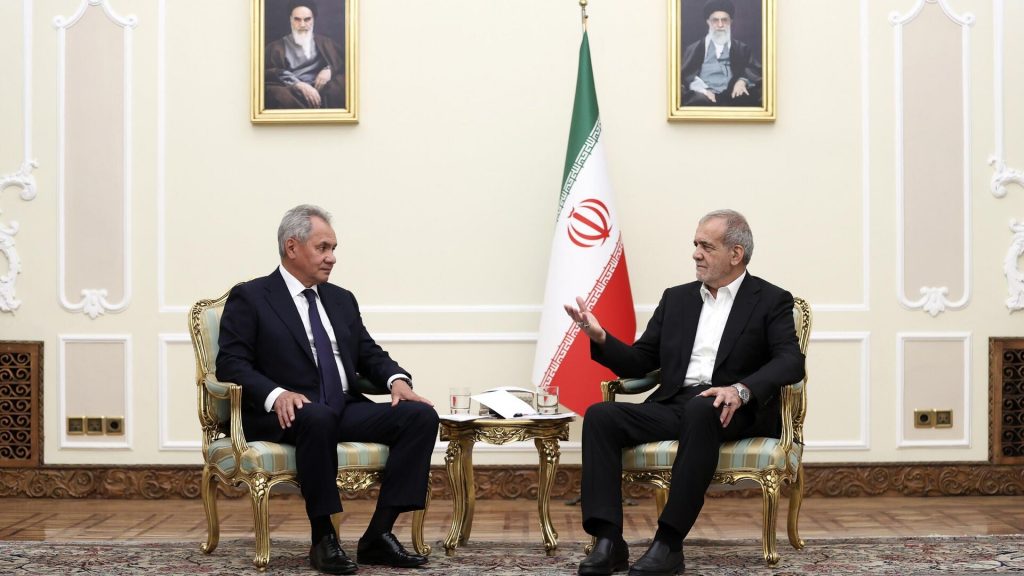
Reuters reports that a source on condition of anonymity said Russian President Vladimir Putin urged Iran’s supreme leader Ali Khamenei to respond with restraint to the assassination of Hamas politburo chief Ismail Haniyeh. “Shoigu’s visit was one of several ways Moscow used to convey to Iran the need for restraint, while condemning Haniyeh’s assassination as a ‘very dangerous murder’ in an effort to prevent war in the Middle East,” the Reuters piece said.
Of course, the Reuters information can be viewed from different angles. On the one hand Russia seems to agree with the Iranian retaliatory strike, but on the other hand it asks to avoid serious escalation. If the strike turns out to be limited and does not cause much damage, Russia can take credit for showing that it is an effective mediator, while rubbing the nose of the US, which is also, despite Israel’s support, looking for ways to prevent a major war.
In the week since the assassination of the head of the Hamas politburo, however, the tone of statements from the Islamic Republic’s leadership has indeed softened. “Our religion does not allow us to attack civilians, so Iran is only targeting military centres. If Iran were free to strike civilian targets, this sinister regime would fall in a matter of days,” said Ayatollah Seyyed Hassan Amoli, a member of Iran’s Council of Experts, as if emphasising reluctance to be drawn into a full-scale war. He was echoed by Iranian Foreign Ministry spokesman Nasser Kanaani, emphasising that the Islamic Republic is “not looking for an escalation of tensions in the region”. “If Iran talks about the right to punish the aggressor, it will be an action that will only help to strengthen security,” the Iranian diplomat explains.
On 7 August, Iranian President Massoud Pezeshkian, in a telephone conversation with his French counterpart Emmanuel Macron, said that the basic principles of Iran’s foreign policy are “renouncing war and seeking to establish world peace.” “But in accordance with international law, Iran will never remain silent in the face of violations of its interests and security,” the Iranian president emphasised.
These and other circumstantial signs suggest that Iran’s retaliatory action is primarily an attempt to save face after the humiliating slap Iran received over the assassination of Ismail Haniyeh. And because of this, Iran is not going to get involved in a large-scale war in the Middle East. Besides, the assassinated Hamas leader was not the most important asset among all Iranian proxies. Hamas’ military wing fought against Iran’s Islamic Revolutionary Guard Corps during the Syrian civil war. In 2011, Ismail Haniyeh openly supported the Syrian opposition in its fight against Bashar al-Assad’s government army, while Iran came out in favour of the current Syrian authorities. It is also true that this is not the first time Iran has faced assassinations in its own country. Suffice it to recall the case of the physical elimination of nuclear scientist Mohsen Fakhrizadeh by Israeli security services, which did not escalate into a full-scale war.
In addition, the US remains a very serious deterrent for Iran, having warned Tehran that an attack on Israel would not be without serious consequences. As the Wachington Post notes, two factors are stopping Iran. The first is the deployment of US warships and fighter jets to the region. The second is U.S. intelligence, which proved that Hamas leader Ismail Haniyeh was not killed by an Israeli missile, as the Iranian military initially claimed.
Today, however, Iran is apparently facing a difficult dilemma: to hit or not to hit? And if it does, how to deal Israel a significant blow without provoking a war that could engulf the entire Middle East. And it appears that this challenge is the main reason that is delaying the retaliatory strike that was considered inevitable until a few days ago.
However, convincing Iran to forgo large-scale retaliation is only half the battle. Then there is Lebanon’s Hezbollah, which is unlikely to be persuaded by the White House and Pentagon. The group remains determined to strike hard in retaliation for the assassination of military commander Fuad Shukr.
“Hezbollah warms up, others prepare
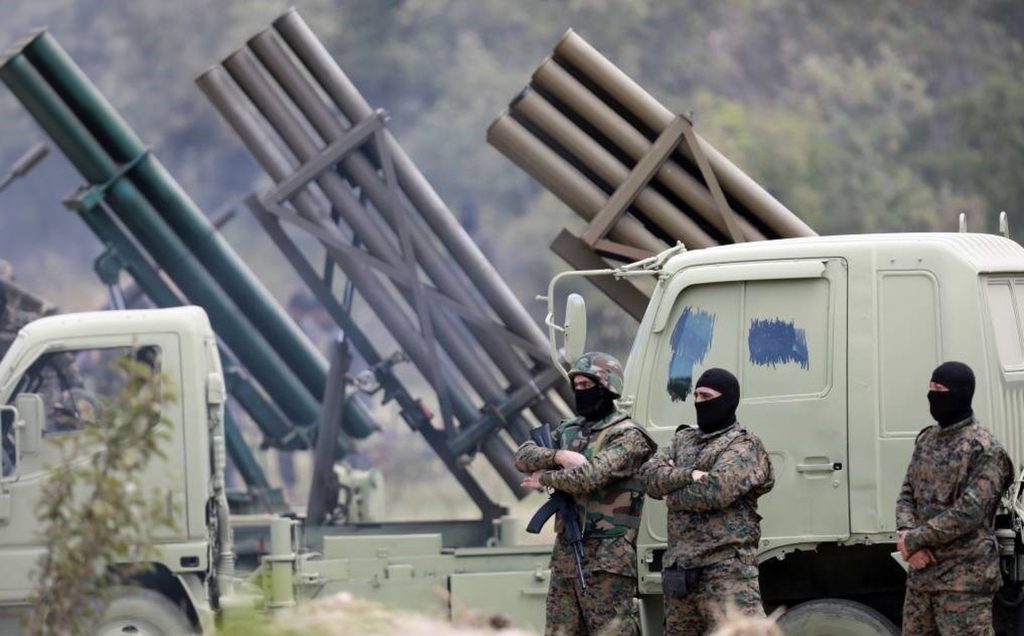
Iran stopped fighting on its territory and with its army after the Iran-Iraq war (1980-1988). Because of the fear of American aggression, the Iranians decided to create a deterrent force in the Middle East that could confront US allies in the region – primarily Israel and Saudi Arabia. Then a new military doctrine was born, based on countering threats and promoting their interests in the Middle East through proxy groups
For this purpose, the IRGC has a special unit called Al-Quds (translated from Farsi as “Jerusalem”). Through it, Iran controls a network of about 50 Shiite groups in Iraq and Syria – Hashd al-Shaabi, the Houthi groups Ansar Allah in Yemen, Hezbollah in Lebanon, as well as Hamas and Islamic Jihad in the Gaza Strip and the West Bank. These proxies are part of the so-called “Axis of Resistance”, which Tehran supports with money, weapons and training.
According to CNN, citing two sources familiar with the intelligence, Hezbollah is now moving faster than Iran in preparing an attack on Israel. According to Israeli intelligence, Hezbollah has 45,000 trained fighters and their arsenals contain more than 70,000 rockets and missiles, including precision and long-range rockets.
Israel and Hezbollah have already exchanged fire along the Lebanon-Israel border since the war with Hamas began. In recent weeks, the conflict has increasingly taken an escalating turn. In response to the continued removal of many of its senior commanders by targeted Israeli strikes, Hezbollah has begun launching missile and drone strikes into northern Israel, mostly targeting what they describe as Israeli military installations, including key intelligence systems and reconnaissance centres. Making matters worse, Hezbollah released a series of UAV footage in June and July that showed detailed aerial views of Israeli military and civilian targets, including bases, infrastructure and border areas in northern Israel. Just hours after the first footage was released, the Israeli military approved plans for a full-scale offensive against Lebanon.
Following Israel’s elimination of Fuad Shuqr, Hezbollah began to consider the Lebanese issue separately from the present and future of Gaza and Hamas. Before that, the movement emphasised that it would stop attacking Israel as soon as the fighting in the Palestinian enclave stopped, but now the situation has changed: Hezbollah intends to avenge the killing of its military commander anyway. Therefore, Iran is afraid to give Hezbollah full freedom of action, arguing that this could lead to a full-scale war in the Middle East.
Nevertheless, while everyone froze in anticipation of a retaliatory strike from Iran, Hezbollah started with a “warm-up”. On 6 August, it launched massive strikes on northern Israel. Alarm sirens went off in 20 locations, including Haifa and Acre. In particular, the town of Nagariya in the Western Galilee was attacked by kamikaze drones, injuring seven people. The Lebanese group said that the attacks targeted military facilities, including the Egoz Battalion base in Nagariya, as well as barracks of the Golani Motorised Infantry Brigade.
Israel retaliated by attacking southern Lebanon – reportedly killing four people. The Israel Defence Forces (IDF) specified that all the dead were Hezbollah members. In addition, as a warning gesture, Israeli fighter jets flew over the Lebanese capital Beirut. The planes flew at low altitude and at maximum speed. The AFP agency, quoting local residents, reported that the fighter jets exceeded the speed of sound, causing two powerful sonic booms in the sky above Beirut. And all this just minutes before Hezbollah chief Hassan Nasrallah was due to speak.
The Israeli overflights could not go unnoticed by the group’s general secretary – he called them a provocation. In addition, Hassan Nasrallah said, “Strikes on Israel are being prepared from Iran, Yemen and Lebanon. Our joint response will be strong, sensitive and effective.” An official at Iran’s post mission to the UN told US television channel CBS that Hezbollah could begin striking deep into Israel, choosing targets other than military targets. Given this, the U.S. Embassy in Beirut urged American citizens to urgently leave the country by any available means. For its part, according to Saudi TV channel Al-Hadath, Hezbollah has also begun evacuating its headquarters and military equipment from the Dahiya neighbourhood in southern Beirut, considered its stronghold. Members of the movement have called on residents of homes where senior Hezbollah officials live to move to safer places.
It must be said that there was an unwritten rule between Hezbollah and Israel that they would not go beyond certain limits in their military operations. This meant that they limited their actions to border areas and areas not in the interior, taking steps mainly against military targets. Now, however, the red lines seem to have been crossed by both sides.
It should be said that it is not only Hezbollah that has become more active. On 5 August, the Iraqi Shiite militia Kataib Hezbollah launched two Katyusha-type missiles at the US base of Ain al-Asad in western Iraq, Reuters reports. At least five U.S. servicemen were wounded in the attack. Iraqi Islamic Resistance groups have their own reasons to retaliate against the Americans: on 30 July, the US military struck Iraq’s Musaib, killing four Kataib Hezbollah fighters. In addition, according to The Washington Post, Abdullah Mastour al-Shabal, the chief drone developer of the Yemeni Houthis, was killed.
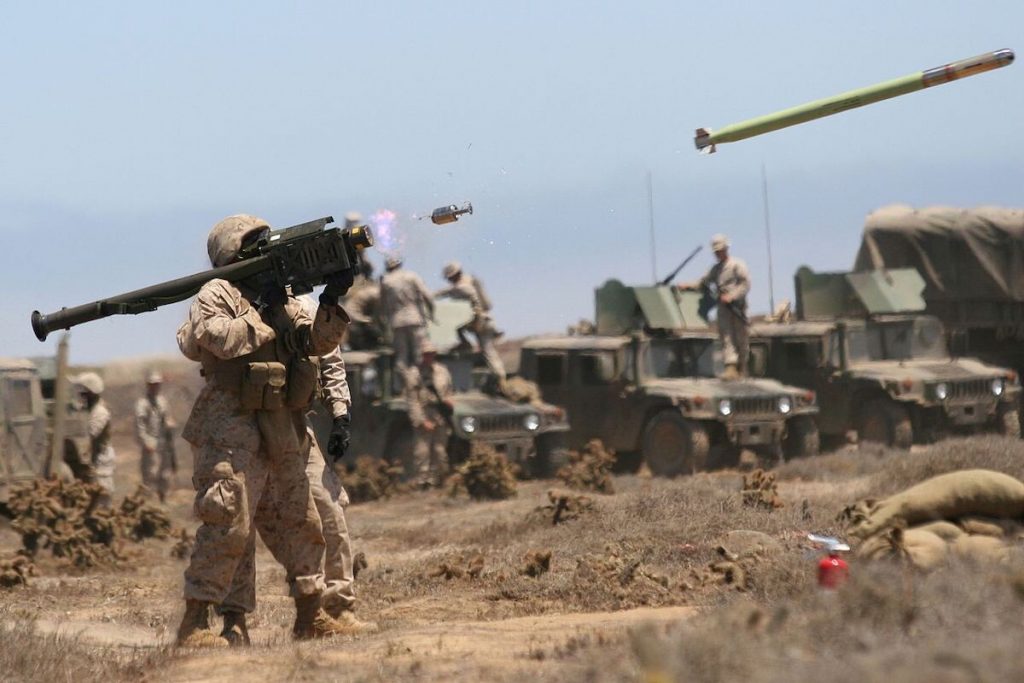
Yemeni Houthi rebels would like to take a more active part in the fighting. Since the beginning of the Israel-Hamas war, the Houthis have launched ballistic missiles and drones at Israel in addition to attacking commercial ships in the Red Sea.On July 19, a Houthi UAV crashed into a building in downtown Tel Aviv, killing a man and injuring several others. Israel retaliated with airstrikes on the port of Hodeidah in the Red Sea.
Iran’s only ally in the Middle East is Syria. However, the government of President Bashar al-Assad is unlikely to help Iran, and neither is Russia, China which buys Iranian oil.
But another country that is clearly not Iran’s ally, but rather Iran’s rival for leadership in the Middle East region, Turkey, has shown Israel its tough stance. It should be said that from the very beginning of the escalation in Gaza, Erdogan has been sharply critical of the Israel Defence Forces (IDF). Both the president and all members of the cabinet, as well as members of the Turkish Grand National Assembly, call Israel’s war nothing less than “genocide,” and Erdogan put Israeli Prime Minister Benjamin Netanyahu on a par with Hitler.
In Turkey, anti-Israeli demonstrations were constantly taking place at the behest of the authorities. It came to the point that two Israeli players were kicked out of the Turkish football league. On international platforms Ankara through the efforts of its lawyers seeks to bring the government of Netanyahu to criminal responsibility, and partly succeeded in this task, when in May the prosecutor of the International Criminal Court demanded the issuance of a warrant for his arrest.
And now the Turkey-Israel conflict has reached a new level. This time, Turkish President Recep Tayyip Erdogan has swung to the highest level of possible escalation – war. “Turkey may enter Israel, “just as it did Libya and Karabakh,” President Erdogan warned. This erupted into a sharp verbal spat. According to most experts, Erdogan’s threatening rhetoric will not be followed by any concrete action, and it is more designed for an internal audience. It is no secret that the opposition often reproaches Erdogan for his passivity in the Middle East. What can Turkey actually implement in order to save face and not look foolish? Naturally, it is providing military-technical and material assistance to Israel’s enemies. What else? Ihor Semivolos, a Ukrainian expert on Middle East issues, believes that Turkey can start naval exercises in the waters of the eastern Mediterranean, closing a part of it for training missile launches. This is enough to give Israeli leaders an acute attack of political migraine.
In general, each side is trying to find its own way to resolve this conflict. Iran is looking for some kind of intermediate solution that would allow it to save face and not unleash the conflict. Israel, by any means, wants to gain a strategic advantage that will permanently close the issue of Palestine. And this can be achieved only in a situation of chaos, but with the support of the US. Although such a chain of events may occur, which neither Tehran nor Jerusalem sees, nor wants to see. And this is what will provoke a major regional war. In any case, the phrase that it is easy to start a war but very difficult to end it is more relevant today than ever.

